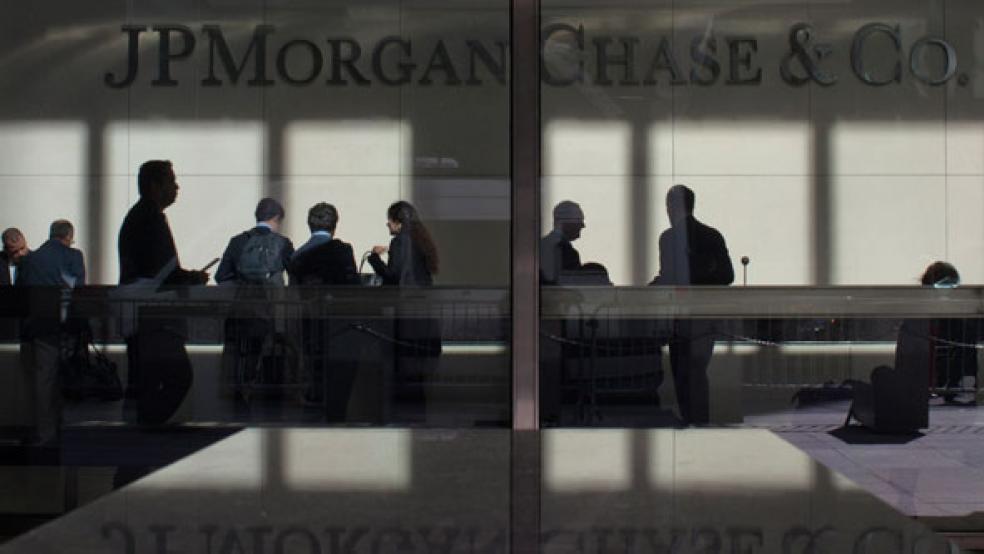This morning, as the final result of JPMorgan Chase’s (NYSE: JPM) $13 billion civil settlement with the Department of Justice over its sale of low quality mortgages became public, hundreds of bankers gathered in a hotel conference room in Washington for a discussion of DOJ’s policy toward financial crime.
A key question on the minds of attendees: After the JP Morgan settlement, can we start relaxing about more mortgage fraud prosecutions?
The answer from DOJ officials: No way.
Related: Will You Have to Pay for JPMorgan’s $13 Billion Fine?
On a panel moderated by longtime banking industry attorney Gordon Greenberg, the question was put to a pair of senior DOJ officials: Andre Birotte, United States Attorney, Central District of California, and Jaikumar Ramaswamy, chief of the DOJ’s Asset Forfeiture and Money Laundering Section.
Greenberg, a partner with the international law firm McDermott Will & Emery, seemed to suggest that after the JPMorgan settlement, you know, maybe enough is enough…?
“Seems as though, from a common sense standpoint, all that has transpired, maybe even culminating with another massive settlement today, albeit civil, for $13 billion dollars, that this is conduct that’s really historical, related to the financial debacle,” he began.
“So from a risk standpoint, if I am a financial institution, in light of all the mortgage guidelines, all the different details that are in place to deal with mortgage issues today throughout the system… Top priority? Mortgage fraud with financial institutions? Or can they put it on a lower risk level now in light of where we are today?”
Absolutely not, said Birotte, whose district includes the city of Los Angeles. “It is a top priority,” he said. “We’ve got a big case in our district, and the reality is that, all the way up to the president, they’ve made it clear that they want to make sure people are held accountable, whether it’s criminal or civil, and utilizes all the tools that are available.”
Ramaswamy, whose office is charged with clawing back the proceeds of criminal activity, sounded as if he couldn’t believe the question was being asked.
“[It’s] obviously a top priority,” he said. “One of the issues you raised is where are we in the lifecycle of this. The reality is that as federal prosecutors, we look at conduct that falls within the statute of limitations. That’s the ultimate arbiter of what we bring or not. Investigations do take time.”
Bankers, he made it plain, may still face prosecution.
“There is risk out there,” he said. “We are going to look very carefully at conduct that we think compromises the financial system, and that’s a priority.”
Buffett’s Words Remembered
Earlier in the conversation, which took place at the annual Money Laundering Enforcement Conference sponsored jointly by the American Bar Association and the American Bankers Association, Greenberg quoted famed investor Warren Buffett’s analysis of the JPMorgan settlement.
In an interview with Bloomberg Television last month, Buffett said that the bank had essentially been bullied into the $13 billion settlement because the company had no leverage to dispute the amount.
“If you’re a financial institution and you’re threatened with criminal prosecution, you have no ability to negotiate,” Buffett said. “Basically, you’ve got to be like a wolf that bares its throat, you know, when it gets to the end. You cannot win.”
Nonsense, said Ramaswamy. “I understand Mr. Buffet’s perspective,” he said. “I frankly disagree with it. I’m a prosecutor – the folks in my office are prosecutors. We look at the facts and follow them where they take us.”
Prosecutors are not “blind to the arguments” that banks make in their defense, he said.
“The reality is, we start with: Is there criminal liability and should we charge you? If the evidence is there, that’s what the determination is,” he said. “The default is: Do we have criminal liability here?”
Attorney Marcos Daniel Jimenez, Greenberg’s partner at McDermott Will & Emery, chimed in next, noting that public companies faced with potential criminal prosecution face a difficult choice. “You can’t afford to have a criminal case filed against you,” he said. “You can afford, maybe, to have a civil case filed against you, but once the government charges you, whether it’s criminal or in a regulatory fashion, you’re toast. Your stock price is going to tank, people are going to want to take their money out of the bank. We’ve seen this happen.”
JPMorgan Chase stock, it should be noted, is up about 28 percent on the year, ahead of the S&P 500’s 25.4 percent gain.
Still, when it comes time to negotiate with DOJ, Jimenez said, “You are coming in to the government wearing kneepads.”
Ramaswamy interrupted to offer some cold comfort. “We have carpets in our office,” he said.
Top Reads at The Fiscal Times:





